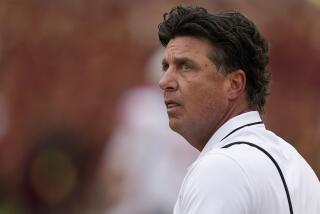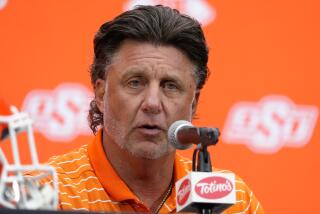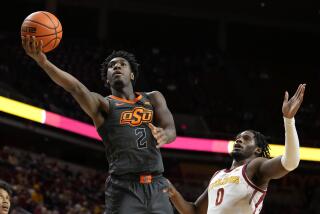Oklahoma Wasn’t His First Option : Football: UCLA told Gundy no. The Sooners not only said yes, they changed their offense to suit their quarterback.
- Share via
If UCLA had offered him a scholarship, junior quarterback Cale Gundy might be leading the Bruins against Brigham Young on Saturday at Provo, Utah, instead of leading Oklahoma against USC at Norman, Okla.
“Growing up as a kid, and in high school, I’d always wanted to go to UCLA,” Gundy said. “If they’d made me an offer, I’d have gone there, no matter what.”
Gundy grew up outside Oklahoma City, about a 30-minute drive from the Oklahoma campus, but he said he was always a UCLA fan.
“Of course, I was an Oklahoma fan, too, but just the West Coast, California and wanting to get out of Oklahoma (made me want to go to UCLA),” he said. “I felt like I could compete out there, and I liked what they were doing.
“And, of course, their offensive coordinator, Homer Smith, is one of the best in the nation.”
But when Gundy completed his eligibility at Midwest City High, where he passed for more than 7,000 yards and 53 touchdowns, UCLA had five quarterbacks on scholarship: Tommy Maddox, Bret Johnson, Jim Bonds, Bert Emanuel and Wayne Cook.
The Bruin coaches told Gundy they didn’t need another.
“When they told me I couldn’t come, it hurt my feelings,” Gundy said. “I was disappointed, and I had to look elsewhere.”
Rejected by UCLA, Gundy looked at several other options before deciding on Oklahoma. He made official recruiting trips to Notre Dame, Alabama, Clemson and Texas.
He also made an unofficial trip to USC after his senior season but said he never considered signing with the Trojans.
And even though his brother, Mike, is an assistant coach at Oklahoma State, where he had been a four-year starter and established himself as the Big Eight’s all-time passing leader, Gundy didn’t seriously consider going there, either.
Gundy chose Oklahoma, where he has been asked to lead the Sooners out of the dark ages.
College football’s most visible and successful proponent of the wishbone, or a variation of it, during the last two decades, the suddenly pass-happy Sooners have opened up their offense to better utilize Gundy’s ability.
“Our focus is our quarterback, Cale, and we’re going to take advantage of his talents,” Coach Gary Gibbs said. “You hear the cliche all the time, but it’s apropos in our case: If the defense wants to give us something in the throwing game, we’ll take advantage of it.”
Nobody is going to confuse Oklahoma with Miami or Brigham Young, but Gundy has established school passing records twice in the Sooners’ last three games.
During a 48-14 rout of Virginia in the Gator Bowl last December, Gundy completed 25 of 31 passes for 329 yards and two touchdowns, setting school records for completions and yardage.
Then, in a 34-9 season-opening victory over Texas Tech two weeks ago, Gundy broke one record by throwing for 341 yards, completing 22 of 28 passes.
Oklahoma’s wishbone quarterbacks needed half a season to pass for that many yards. During the Sooners’ national championship season of 1985, quarterback Jamelle Holieway passed for only 517 yards in 11 games.
Gibbs, who replaced Barry Switzer before the ’89 season, wanted a more balanced attack, and he wanted Gundy to lead it.
“I think Cale wanted to go to Oklahoma, but I think he also wanted to go someplace that would suit his talents,” said Larry Coker, Oklahoma’s offensive coordinator.
Gibbs told him he could do both.
“They weren’t very successful in the option game in the late ‘80s, and Coach Gibbs told me, ‘It’s time for us to make a change and get with the program like everybody else,’ ” Gundy said.
One reason Gundy signed with Oklahoma was because he believed that he could “do some good things in a hurry,” but Gibbs didn’t change the offense overnight.
As a freshman, Gundy threw 109 passes, completing 54 for 904 yards and four touchdowns. Those might seem like modest totals, but it was the 10th-best season by an Oklahoma passer.
Last season, not including the Gator Bowl, Gundy passed for 1,228 yards and eight touchdowns, completing 52.9% of his 172 passes.
That was the third-best season by an Oklahoma passer.
“We knew we weren’t just going to jump right in,” said Gundy, who could replace Bob Warmack as Oklahoma’s all-time passing leader by the end of the season. “We had to develop and take time. We had to get some true wide receivers. When I first came in, we had running back-defensive back converters (at wide receiver).”
In two games this season, Gundy has completed 75% of his 36 passes for 438 yards and three touchdowns as Oklahoma’s undisputed leader.
“He was certainly a talent as a freshman (and) sophomore--there’s no question about that--but he’s a much more complete, much more poised, (more of an) in-control quarterback than he was two years ago, or even last year,” said Coker, who moved to Oklahoma two years ago after coaching Gundy’s brother at Oklahoma State.
In rolling over Texas Tech and Arkansas State, 61-0, Oklahoma has run for 489 yards and passed for 519.
Will this be the year the Sooners gain more yards through the air than on the ground?
“I don’t know that,” Coker said. “I think it will be a year that Oklahoma is more balanced . . . but with Cale’s skills and our ability to protect (him) and catch the football, that’s a possibility.”
Reaction to the new offense has been great, Gundy said.
“I can remember coming in my freshman year (when), even in warm-ups, if I completed a five-yard pass, 50,000 or 60,000 people would go crazy. They’d act like they just saw someone walk on the moon. The people around here love it, and they’re excited about what we’re doing.”
As is Gundy.
“I feel real confident, and the coaches do, too,” he said. “We’re a lot more mature. We’re smarter. We’ve done some things in the passing game that we wouldn’t have been able to do a year or two ago because we weren’t smart enough or mature enough.”
Or so inclined.
More to Read
Go beyond the scoreboard
Get the latest on L.A.'s teams in the daily Sports Report newsletter.
You may occasionally receive promotional content from the Los Angeles Times.






